“I bade adieu to Mount Vernon, to private life, and to domestic felicity; and with a mind oppressed with more anxious and painful sensations than I have words to express.”
~ George Washington
Diary Entry April 16, 1789
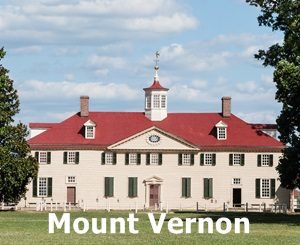
1789– Newly elected President George Washington left his Mount Vernon, Virginia, home and headed for New York City’s Federal Hall (site of the first U.S. Capitol), where two weeks later, he was sworn in as the first American president.
Washington admitted that he would have preferred to stay in retirement, but disturbed by growing antagonism between the fledgling nation’s political factions, he felt duty-bound to help resolve what he feared was an impending crisis.
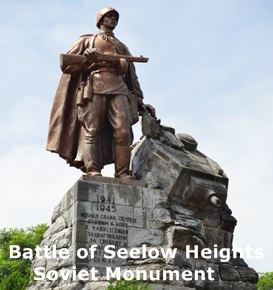
1945– The Soviet Army began the final assault on German forces around Berlin, with nearly one million troops fighting in the four-day Battle of Seelow Heights.
The result was the encirclement of the German 9th Army, the last major defensive line outside Berlin. Within two weeks, Adolf Hitler was dead and the war in Europe was effectively over.
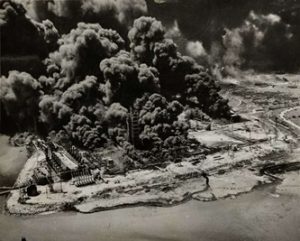
1947– A giant explosion occurred during the loading of ammonium nitrate as well as tobacco and government-owned ammunition onto the freighter Grandcamp at a pier in Texas City, Texas.
Nearly 600 people lost their lives and thousands were injured when the ship was literally blown to bits.
Water and an extinguisher were used to fight the fire, but hoses were not employed for fear of ruining the cargo; there were already 2,200 tons loaded on the ship.
While the ammunition was removed from the ship, the crew attempted to restrict oxygen to the hold in hopes of putting out the fire. They did not realize that because of ammonium nitrate’s chemical composition, it does not require oxygen to burn.
By 9 a.m., flames had erupted from the hold and within minutes it exploded. The blast was heard 150 miles away and was so powerful that the ship’s 1.5- ton anchor was found two miles away.
The force of the explosion lifted another ship completely out of the water. People working at the docks were killed instantly.
Pieces of flaming debris damaged the oil refineries in the area. A nearby Monsanto chemical storage facility also exploded, killing 234 of the 574 workers there. A residential area of 500 homes was also leveled by the blast.
Another ship, the High Flyer, which was carrying similar cargo, was pushed completely across the harbor.
The crew fled when it came to rest, failing to notice that a fire had started and the next day their ship also exploded.
581 people died and over 5,000 were injured. The explosion caused $100 million ($1.1 billion in today’s terms) in damages.
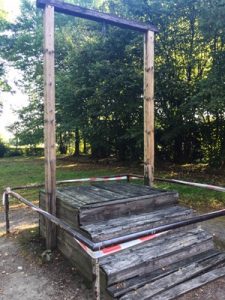
1947– Rudolf Höss, the longest-serving (3 ½ years) commandant of the Auschwitz concentration and extermination camp, was executed by hanging.
The sentence was carried out next to the crematorium of the former Auschwitz I concentration camp.
The gallows (shown above) were specifically built for the Höss execution and were never used again. They stand today as a reminder of the horror that took place at Auschwitz.
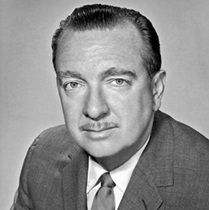
1962– Walter Cronkite succeeded Douglas Edwards as anchorman of the CBS News nightly broadcast. He remained in that position until March 6, 1981.
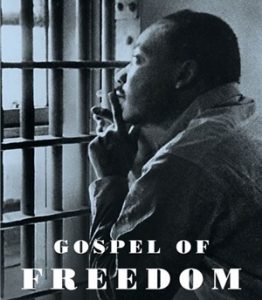
1963– The Letter from Birmingham Jail (also known as the Letter from Birmingham City Jail and The Negro Is Your Brother) was an open letter written by Martin Luther King Jr.
He wrote it as he sat in a cell at Birmingham, Alabama for violating an injunction that outlawed “parading, demonstrating, boycotting, trespassing and picketing.”
The letter defended the strategy of nonviolent resistance to racism. It said that people have a moral responsibility to break unjust laws and to take direct action rather than waiting potentially forever for justice to come through the courts.
Responding to being referred to as an “outsider,” King wrote, “Injustice anywhere is a threat to justice everywhere”.
The letter was widely published, and became an important text for the American Civil Rights Movement.
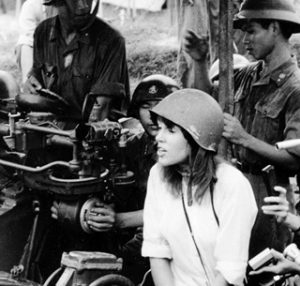
1972– In an effort to help blunt the ongoing North Vietnamese Nguyen Hue Offensive, the United States resumed the bombing of Hanoi and Haiphong after a four-year lull.
In the first use of B-52s against both Hanoi and Haiphong, and the first attacks against both cities since November 1968, 18 B-52s and about 100 U.S. Navy and Air Force fighter-bombers struck supply dumps near Haiphong’s harbor.
Sixty fighter-bombers hit petroleum storage facilities near Hanoi, with another wave of planes striking later in the afternoon. A White House spokesman announced that the United States would bomb military targets anywhere in Vietnam in order to help the South Vietnamese defend against the communist onslaught.
Actress Jane Fonda became infamous for travelling to North Vietnam three months later to protest the bombing renewal. She was pictured sitting on a North Vietnamese anti-aircraft battery, wearing a helmet (an image that still enrages veterans), and more than anything else, earned her the nickname “Hanoi Jane”.
North Vietnamese press reported — and Fonda later confirmed — that she made several radio announcements over the Voice of Vietnam radio to implore U.S. pilots to stop the bombings.

1992– The House ethics committee dropped a political depth charge when it released the names of 303 current and former lawmakers who overdrew their accounts at the now-closed House of Representatives Bank.
In less than four years, House members wrote nearly 20,000 bad checks totaling almost $11 million. The scandal contributed to a perception of corruption and malfeasance and was a contributing factor to major changes in the House, in which 77 Representatives resigned or were ousted in the 1994 election.
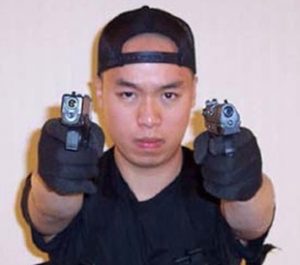
2007– In one of the deadliest mass shootings in U.S. history, 32 people died after being gunned down on the campus of Virginia Tech by Seung Hui Cho, a student at the college who later committed suicide.
The shooting began around 7:15 a.m., when Cho, a 23-year-old senior and English major, shot a female freshman and a male resident assistant in a campus dormitory before fleeing the building.
Police were soon on the scene; unaware of the gunman’s identity, they initially pursued the female victim’s boyfriend as a suspect in what they believed to be an isolated domestic-violence incident.
However, at around 9:40 a.m., Cho, armed with a 9-millimeter handgun, a 22-caliber handgun and hundreds of rounds of ammunition, entered a classroom building, chained and locked several main doors and went from room to room shooting people. Approximately 10 minutes after the rampage began, he died from a self-inflicted gunshot wound.
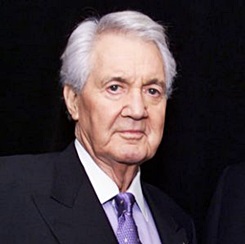
2013– Pat Summerall died of cardiac arrest at the age of 82.
Summerall spent ten years in the National Football League, primarily as a placekicker, but he is best remembered for his career as a sportscaster; in football, golf and tennis.
He announced 16 Super Bowls, 26 Masters Tournaments, and 21 U.S. Opens, in addition to covering NCAA basketball, bowling and boxing.
The National Sportscasters and Sportswriters Association named Summerall National Sportscaster of the Year in 1977, and inducted him into its Hall of Fame in 1994.
Summerall was the 1994 recipient of the Pete Rozelle Radio-Television Award, bestowed by the Pro Football Hall of Fame “for longtime exceptional contributions to radio and television in professional football”.
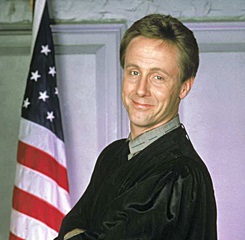
2018– Actor Harry Anderson died of a stroke due to influenza and heart disease. He was 65.
He is best known for the role of Judge Harry Stone on Night Court, and later starred in the sitcom Dave’s World.
Anderson also had a recurring guest role as con man Harry “The Hat” Gittes on Cheers.
Compiled by Ray Lemire ©2019 RayLemire.com / Streamingoldies.com. All Rights Reserved.
Ray great read!! I forgot about Grandcamp!! This is why we need to never forget our history!! I remember in school I could have cared less little did I know how inportant history is and always will be!! Thanks for the read Ray good way to have my first cup of java!!!
Ray great read!! I forgot about Grandcamp!! This is why we need to never forget our history!! I remember in school I could have cared less little did I know how inportant history is and always will be!! Thanks for the read Ray good way to have my first cup of java!!!
Thank you, Fred! It’s always nice to know people enjoy these lessons. It makes all the work worth the effort.
WOW … I never heard about the explosion in Texas City, what a very sad day! …. not far up the coast from where my dad’s side of the family lived!
Need to find a way to stop the mass shootings, so out of control!!! Didn’t seem to have these problems when we were growing up …. why now??
Why? I think a lot of the blame goes to social media and the fact that people long ago lost something very important; Respect for others.